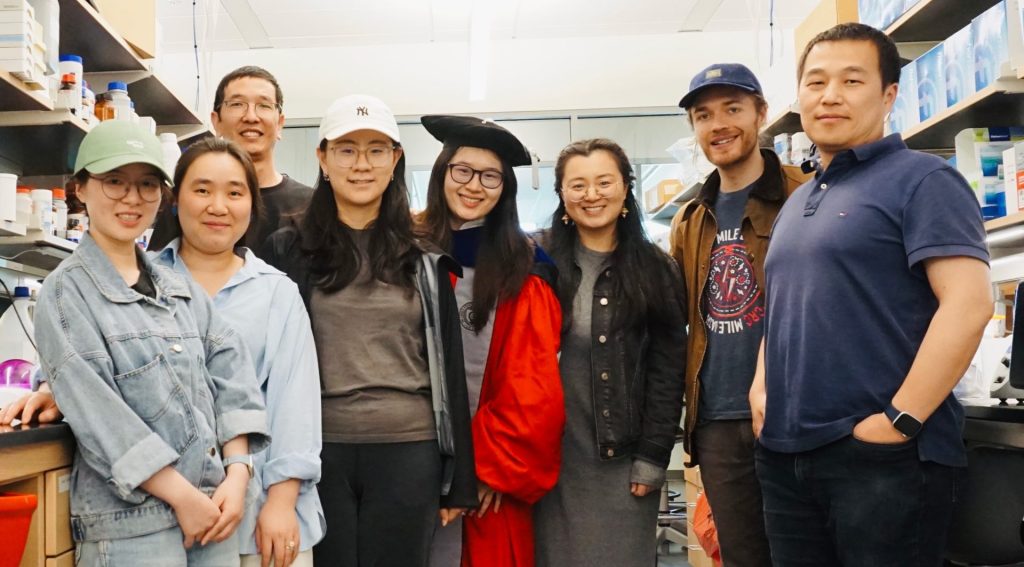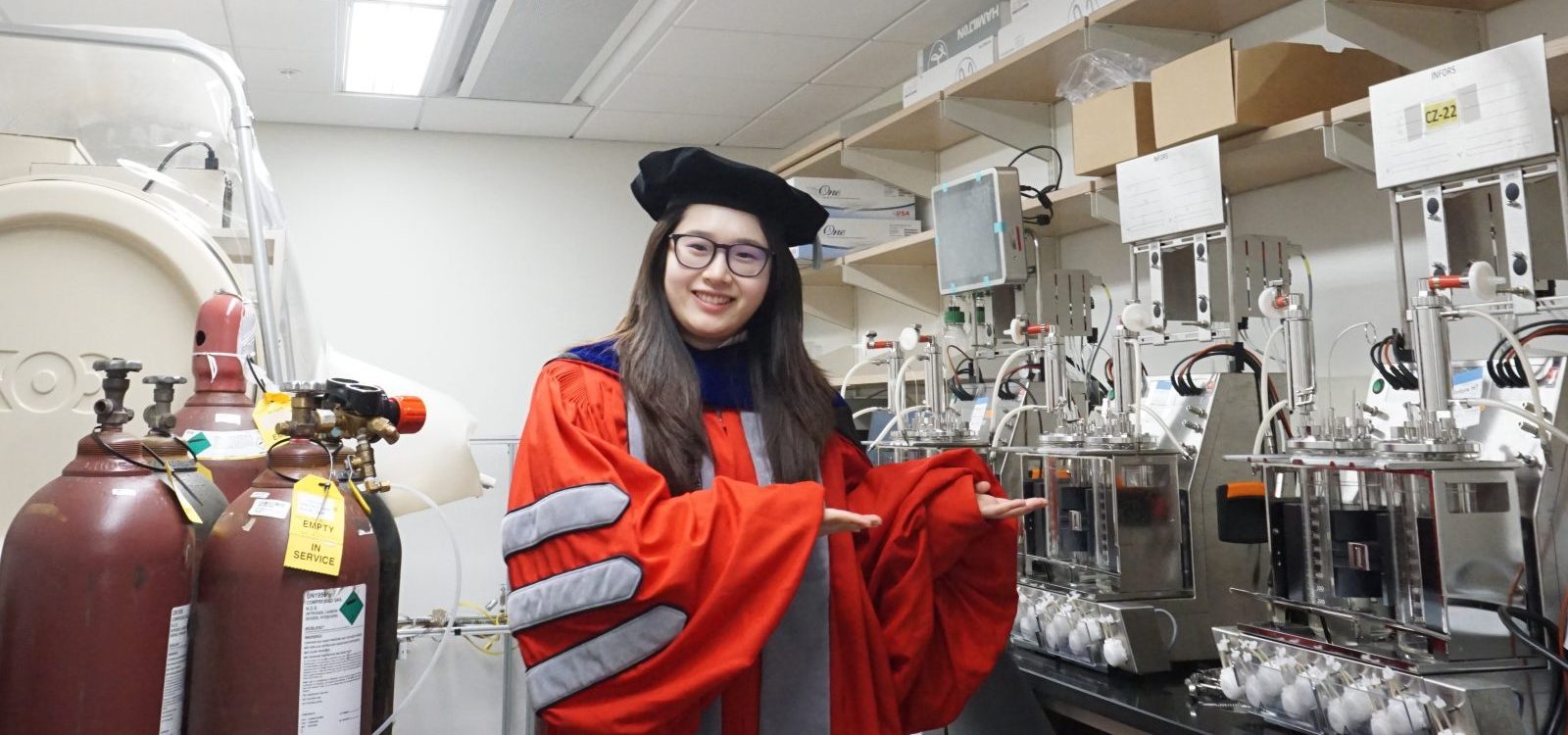When Shiqi Zhang’s mother was diagnosed with type 2 diabetes 20 years ago, she did not yet know her mother’s struggles would define the course of her career.
She only knew the daily sacrifices her mother made: trading white rice for sweet potatoes, refusing cake or candy, no matter how tempting, fighting to control her blood sugar without professional guidance.
Her mother’s health became both her motivation and her compass, shaping research that continues to honor her mother’s journey while helping countless others.
“There was one time during high school where she was emergently admitted to the hospital because her blood sugar spiked so suddenly,” said Shiqi Zhang, ’19 BS, ’24 PhD. “This experience gave me a very personal reason to study nutrition and interest in helping others facing similar challenges.”
“My mother’s health has always been my drive,” Zhang said. “Every step I take in research is, in some way, for her.”
A foundation for research
Her motivation to understand how food could be both a risk and a solution carried Zhang to the College of Education and Human Ecology, where she spent nearly nine years earning her bachelor’s and doctorate.
Her path into research began as an undergraduate in Associate Professor Sanja Ilic’s lab, which opened her eyes to the possibility of scientific discovery as a career. “The valuable opportunity to work in Professor Ilic’s lab made me think research could be my future direction,” Zhang said.
When Zhang applied to the nutrition sciences program, Chris Zhu, associate professor of human nutrition, who would eventually become her advisor, recruited her to be part of his lab.
“I was really impressed by Dr. Zhu’s research focus and grateful to be invited to work in his lab,” Zhang said.
The Zhu lab is a metabolomics-based research group, combining the study of Mass Spec-based metabolomics with other disciplines and omics data analysis approaches such as machine learning model to understand disease, predict outcomes and develop new nutrition intervention approaches.

Under Zhu’s guidance, Zhang became a graduate research assistant, where she dove into research of the gut microbiome with tools like bioreactors, metabolomics and microbiological assays.
“Over the years working with Dr. Zhang, I have been deeply impressed by her intelligence, strong work ethic and independent thinking,” Chris Zhu said. “She has made numerous original contributions to our research projects, establishing herself as an exceptional young scientist who is well on her way to becoming a leader in her field.”
Beyond the lab, Zhang also presented at international conferences such as the American Society for Nutrition and the American Society for Mass Spectrometry.
“These opportunities helped me see myself as part of a global scientific community,” Zhang said.
Building the Human Colonic Model
While at the college, Zhang led the development of a Human Colonic Model which simulates the environment of the human large intestine. This model is used to study the nuanced interactions between nutritional and dietary components and human gut microbiota in a controlled, reproducible way and collect large intestine content in an easy, accessible way.
“The Human Colonic Model developed and optimized by Dr. Zhang has the advantage of highly resembling the ecological system of human gut microbiota – while independent of the influence of the human body– which is complicated and costly to follow in humans and for which ethical considerations make some experiments prohibitive,” said Rachel Kopec, associate professor of human nutrition.
Kopec further noted that not only has the system been applied to several of Zhang’s research questions, but it also has greatly benefited the Zhu Lab, as well as its collaborators, by asking impactful health and disease-related questions regarding the microbiome-host interaction.
Creating the model was very ambitious.
One of the main challenges was replicating the complexity of the human colon environment.
“It’s not just one space; there are multiple regions with different pH levels, nutrient flows and microbial populations,” Zhang said.
Another challenge was turning Zhu’s and Zhang’s ideas into a real operating system; the group communicated closely with mechanical engineers on how to design customized frames and parts that replicated the complexities of the human colon environment.
What came to life was a glass-bodied ecosystem, framed in steel, with wires and tubes trailing like lifelines to chambered reservoirs. Built to perform like a human gut, the system circulated fluids, nutrients and microbial communities with precision. The helm of the device housed a display screen, tracking data points on the microbes’ growth patterns and growth environment in real time.
“Unlike traditional single batch fermentation methods, which capture only snapshots of microbial activity, the Human Colonic Model provides a long-term, dynamic view, maintaining a complex microbiota for months at a time. Our upgraded TWIN-HCM system contains two sets of bioreactors allowing us to run a control experiment and a treatment experiment side by side,” Zhang explained.
Zhang remembers vividly the day the system first worked.
She recalled setting things up carefully with Xiaowei Sun, a postdoctoral colleague during this time. It was the first time they had run a formal experiment with the model testing black raspberry extract.
She nervously checked the model the next morning.
“The control vessel without bacteria was completely clear,” Zhang said. “This meant no contamination, and the system was functioning exactly as designed.”
In that moment, Zhang said she felt like all the planning, assembling and troubleshooting had paid off.
“It was both a relief and a thrill, and it really confirmed that this was going to be a powerful tool for my research.”
Discoveries with real-world impact
Through the Human Colonic Model, Zhang and her team uncovered how foods rich in polyphenols — such as black raspberries and green tea — interact with gut microbes.
They observed shifts toward beneficial species such as Akkermansia muciniphilia and increases in health-related metabolites such as short chain fatty acids. These changes are linked to improved gut health, reduced inflammation and lowered risk of chronic diseases, including diabetes and metabolic syndrome.
“Your microbes aren’t just passengers,” Zhang said. “They are active partners in your gut health. When the balance is right you feel it — good appetite, no digestive discomfort, even a better mood. When it’s disrupted, the effects can be serious.”
Zhang’s vision is to make nutrition guidance more personalized and actionable.
“By understanding how specific foods or compounds influence gut microbiota and metabolism, we can tailor dietary interventions to individuals,” Zhang added. “Whether that’s improving metabolic health, supporting healthy infant development or reducing risk of chronic disease.”
Honored as a distinguished leader
During her time in college, Zhang’s contributions did not go unnoticed.
She was supported by her faculty advisor and mentors in publishing 20 peer-reviewed publications, serving as first author for six of them. She was recognized as a 2023 American Society of Nutrition Robert Suskind and Leslie Lewinter-Suskind Pediatric Nutrition Student Award winner and was honored with multiple departmental and college-level awards and fellowships.
This past spring, she was named the recipient of the college’s Distinguished Dissertation Award, one of the college’s highest honors for graduate research. She was celebrated during the college’s 2025 spring Commencement for Master’s, Specialist and Doctoral Graduates.
Standing among the crowd during commencement, Zhang recalled reflecting about how far she had come — from a girl watching her mother’s daily sacrifices, to a scientist building systems that may one day transform patient care.
“It was very meaningful to have my work recognized in this way,” she said. “It reminds me why I started, and who I am doing this for.”
Looking ahead
Today, Zhang is a postdoctoral fellow at the Center for Precision Medicine at UT Health Center at San Antonio. Her current research integrates spatial metabolomics, microbiome analysis and kidney studies to better understand kidney-gut axis in diabetic kidney disease.
Looking to the future, she envisions a career at the intersection of translational research and clinical dietetics, bridging the gap between laboratory discovery and practical dietary strategies for patients.
From her mother’s diagnosis two decades ago, to pioneering a model that is reshaping microbiome research, Zhang’s journey reflects the power of deeply personal motivation paired with rigorous scientific training.
And as her work continues, the promise is clear — a future where nutrition guidance is more personalized, more precise and more impactful than ever.

